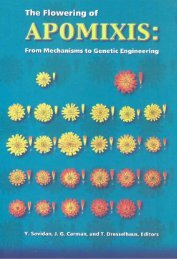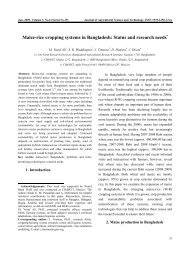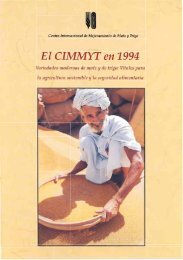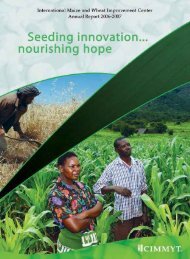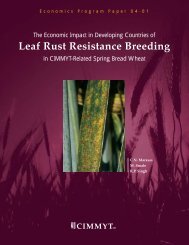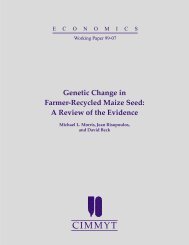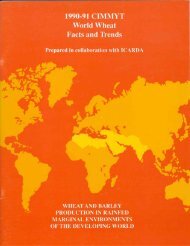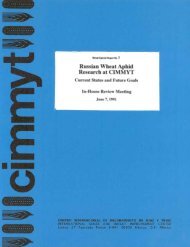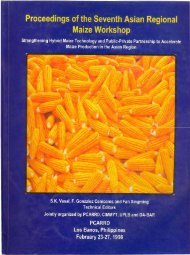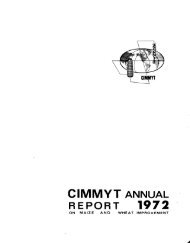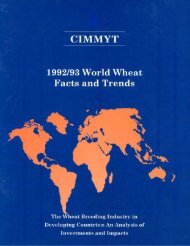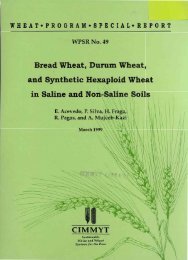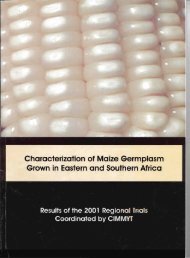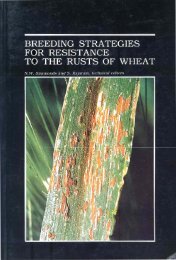Proceedings of the Fifth Asian Regional Maize Workshop - Search ...
Proceedings of the Fifth Asian Regional Maize Workshop - Search ...
Proceedings of the Fifth Asian Regional Maize Workshop - Search ...
Create successful ePaper yourself
Turn your PDF publications into a flip-book with our unique Google optimized e-Paper software.
In recent years, many new companies have entered <strong>the</strong> seed business in developing countries.<br />
This can be attributed to:<br />
- Greater availability <strong>of</strong> hybrids in several crop species.<br />
- Easing <strong>of</strong> government policies pertaining to <strong>the</strong> private sector entering <strong>the</strong> seed<br />
business.<br />
Availability <strong>of</strong> hybrids<br />
A partial list <strong>of</strong> crops for which hybrids are available can be seen in Table 4. Historically,<br />
<strong>the</strong> seed industry in developed countries has expanded by developing and selling hybrids<br />
(Table 5). The industry generally shifts towards hybrids whenever <strong>the</strong>y are technically and<br />
economically feasible. Nearly ~ <strong>of</strong> <strong>the</strong> total global commercial seed business <strong>of</strong> about US$15.0<br />
billion is accounted for hybrid sales in various crops. Importantly, with hybrids breeders can<br />
protect <strong>the</strong>ir intellectual property in <strong>the</strong> form <strong>of</strong> trade secrets. The parent lines required to<br />
produce <strong>the</strong> hybrid are kept secret by <strong>the</strong> breeding company. Hybrids <strong>the</strong>reby enable companies to<br />
obtain an acceptable return on <strong>the</strong>ir investment ei<strong>the</strong>r directly in <strong>the</strong> form <strong>of</strong> gross margins, or<br />
indirectly in <strong>the</strong> form <strong>of</strong> royalties, or both. With proper incentives, <strong>the</strong> private sector can<br />
become a dynamic force in hybrid seed industry development in <strong>the</strong> Third WOrld. Recent activity<br />
by <strong>the</strong> private sector in developing countries in Asia and Latin America indicates that <strong>the</strong>re are<br />
ample business opportunities in hybrids.<br />
Table 4.<br />
Available hybrid systems and selected examples.<br />
Hybrid System<br />
Crops<br />
Manual or mechanical emasculation<br />
Chemical (Gibberellins, A9N0 3<br />
,<br />
Ethre1, etc.)<br />
Cytoplasmic male sterility (OMS)<br />
self incompatibility (51)<br />
Natural genetic male sterility (ms ms)<br />
Engineered genetic male sterility (NMS)<br />
- Corn<br />
- Tomato<br />
- Cucumber<br />
- Melon<br />
- SOrghum<br />
- Rice<br />
- Millet<br />
- Sunflower<br />
- Cabbage<br />
- Broccol i<br />
- Pigeon Peas<br />
- Oilseed Rape<br />
GoverT1lll8l"lt deregulation<br />
one <strong>of</strong> <strong>the</strong> most notable examples <strong>of</strong> deregulation in <strong>the</strong> developing world is India's "New<br />
seed Policy", which was announced in 1988. As a result <strong>of</strong> <strong>the</strong> new policy, many new national and<br />
multinational companies entered <strong>the</strong> seed business in India. "rhe newcomers include Indian Tobacco<br />
Co. (ITe), Sandoz, Cargill, Hoechst, Ciba-Geigy, ICI, SPIC, Bejo, Hindustan Lever, Harrisons<br />
Malaya1am and JK seeds. Similarly, deregulation in Thailand and Philippines has led to a sizable<br />
expansion in <strong>the</strong>ir hybrid seed industries over <strong>the</strong> past 5 years. Government policy makers can<br />
learn a lesson from this phenomenon. Even slight deregulation <strong>of</strong> <strong>the</strong> sort introduced in India<br />
can spur enormous development in a country's seed industry.<br />
Policy makers can continue to create incentives for expansion, as is currently happening<br />
in several developing countries. The aim <strong>of</strong> any seed policy should be to ensure that elite seed<br />
is made available to farmers. Legislation that hinders this goal is counterproductive. If <strong>the</strong><br />
private sector is to be a partner in <strong>the</strong> effort to develop, produce, and distribute hybrid seeds,<br />
<strong>the</strong> principles by which <strong>the</strong> industry operates should be considered in national policy making.<br />
228



